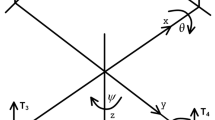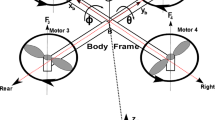Abstract
Considering the diverse effect on the electric steering gear servo system of unmanned surface vehicles (USV) caused by the external disturbances and parameter perturbations, a novel discrete adaptive global sliding model control scheme (AGSMC) is proposed in this paper. By introducing a nonlinear switch function, the system trajectory stays on the designed sliding manifold at the initial time. On the basis of discrete nonlinear adaptive reaching law, linear extrapolations are adopted to estimate the system uncertainty dynamics to ensure the robustness of the control system. Simulation results show that, in contrast with other discrete sliding mode control methods which are based on the exponential approach law, the proposed AGSMC schemes achieve enhanced tracking precisions with reduced control consumptions where chattering is significantly suppressed.
Access this chapter
Tax calculation will be finalised at checkout
Purchases are for personal use only
Similar content being viewed by others
References
Yan R, Liu ZH, Zhou R (2013) Application of low speed opto-electronic tracing systems based on sliding mode disturbance observer. J Beijing Univ Aeronaut Astronaut 39(6):835–840
Wu Y, Liu Y, Tian D (2013) A compound fuzzy disturbance observer based on sliding modes and its application on flight simulator 2013(2):388–400
Li Y, Sun DY (2010) Research on electro-mechanical actuator system based on discrete-time variable structure control. In: 2010 second WRI global congress on intelligent systems, pp 16–19
Utkin VI (1977) Variable structure systems with sliding modes. IEEE Trans Automatic Control AC–22(2):212–222
Utkin VI (1992) Sliding modes in control and optimization. Springer, Heidelberg, pp 1–70
Ghazi SE (1996) Analysis of VSC system designed via the reaching law approach. In: Proceedings of southeastcon bringing together education, science and technology, pp 170–174
Bayindir MI, Can H, Akpolat ZH et al (2005) Application of reaching law approach to the position control of a vector controlled induction motor drive. Electr Eng 87(4):207–215
Roopaei M, Zolghadri M, Meshksar S (2009) Enhanced adaptive fuzzy sliding mode control for uncertain nonlinear systems. Commun Nonlinear Sci Numer Simul 14(9–10):3670–3680
Li P, Zheng ZQ (2012) Robust adaptive second-order sliding-mode control with fast transient performance. IET Control Theor Appl 6(2):305–312
Choi HS, Park YH, Cho YS et al (2001) Global sliding mode control improved design for a brushless DC Motor. IEEE Control Syst Mag 21(3):27–35
Pang HP, Chen X (2009) Global robust optimal sliding mode control for uncertain affine nonlinear systems. J Syst Eng Electron 20(4):838–843
Gao WB, Wang YF, Homaifa A (1995) Discrete-time variable structure control systems. IEEE Trans Ind Electron 42(2):117–122
Li J, Ren Q (2008) Study on supply air temperature forecast and changing machine dew point for variable air volume system. Build Energ Environ 27(4):29–32 (in Chinese)
Acknowledgments
This work is supported by the Fundamental Research Funds for the Central Universities (under Grant 3132018130).
This work is supported by the National Natural Science Foundation of P. R. China (under Grants 51009017 and 51379002), Applied Basic Research Funds from Ministry of Transport of P. R. China (under Grant 2012-329-225-060), China Postdoctoral Science Foundation (under Grant 2012M520629), the Fund for Dalian Distinguished Young Scholars (under Grant 2016RJ10), the Innovation Support Plan for Dalian High-level Talents (under Grant 2015R065), and the Fundamental Research Funds for the Central Universities (under Grant 3132016314)
Author information
Authors and Affiliations
Editor information
Editors and Affiliations
Rights and permissions
Copyright information
© 2020 Springer Nature Switzerland AG
About this paper
Cite this paper
Zheng, Z., Wang, N., Zhao, H. (2020). Adaptive Discrete-Time Sliding Mode Control of Brushless DC Motor Servo System for Unmanned Surface Vehicles. In: Xu, Z., Choo, KK., Dehghantanha, A., Parizi, R., Hammoudeh, M. (eds) Cyber Security Intelligence and Analytics. CSIA 2019. Advances in Intelligent Systems and Computing, vol 928. Springer, Cham. https://doi.org/10.1007/978-3-030-15235-2_72
Download citation
DOI: https://doi.org/10.1007/978-3-030-15235-2_72
Published:
Publisher Name: Springer, Cham
Print ISBN: 978-3-030-15234-5
Online ISBN: 978-3-030-15235-2
eBook Packages: Intelligent Technologies and RoboticsIntelligent Technologies and Robotics (R0)




